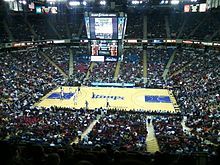Sacramento subsidy could win Kings
April 11, 2013
By Katy Grimes
Sacramento could become known as the little government town that could. As Sacramento officials fight to prevent the Sacramento Kings basketball team from being lost to Seattle, the public subsidy the officials are offering is looking ridiculous — and unsustainable.
With its historical, abiding inferiority complex, Sacramento has long suffered under the absurdity and indiscretion of city officials who claim an economic rebirth will only occur if hundreds of millions of taxpayer dollars are spent on a new sports arena. And they do this with blatant disregard of the voters’ unwillingness to spend public money on an arena or professional sports team.
If the competition to keep or get the Kings is about which city has the best public subsidies to curry favor with the NBA, Sacramento wins hands down over Seattle.
But as more details are bounced around in the Sacramento arena deal, it is becoming apparent Sacramento should lose in overtime.
Needling Sacramento
A story in the Seattle Times Tuesday confirmed just how far Sacramento will go to make the deal. “Take Sacramento’s $447 million arena plan. It was unveiled to the public and then passed by their City Council only three days later,” Times columnist Danny Westneat wrote.
“Can you imagine the reaction from the Seattle process factory if our mayor put forth a half-billion-dollar public-private partnership and wanted it approved in just three days?”
Westneat added, “But beyond the haste here’s what is in Sacramento’s arena plan. It’s 60 to 75 percent public subsidies, depending on who’s counting.”
Bowing to the masters
Senate President Pro Tem Darrell Steinberg, D-Sacramento, recently returned from a trip to New York City with Sacramento Mayor Kevin Johnson. They weren’t on a political junket, but went to the Big Apple to convince the National Basketball Association to allow Sacramento to keep the Kings.
Seattle, a city of 620,000, has 3.5 million in its metro area. Sacramento, on the other hand, has 470,000 city residents, with 2.5 million in the metro area.
The little government city that could…
Instead of getting down to the business of repairing Sacramento’s economy, along with its deep potholes, failing sewer system and diminished city services, Mayor Johnson, together with a team of city council members, has kept his eye on the basketball — at the expense of city business.
Sacramento City Councilman Kevin McCarty has been a vocal opponent of the arena deals, primarily because of what he says is an unsustainable public contribution. I called and emailed him to discuss his opposition, but he did not call back.
In a Sacramento Bee story, McCarty called the subsidy “overly generous” and warned it could “bring the city enormous misfortune if arena revenue doesn’t pan out as projected…. The risk outweighs the rewards.”
Show me the money
The Sacramento arena would not be getting so much attention if the arena deal was a purely private sector arrangement. In fact, private funding probably would bring it wide support in the region.
City of Sacramento officials claim the deal calls for $258 million of public taxpayer subsidy. A private investment group will contribute $189 million to the arena construction, and would be responsible for all capital improvements.
According to public policy watchdog group Eye on Sacramento, the deal actually calls for an additional $75 million of public subsidies that have not been counted by the city, or included in the city’s numbers.
Add this additional $75 million to the subsidy pot, along with Sacramento County’s public contribution, and the subsidy amounts not to a 53 percent public subsidy as city officials keep repeating, but is closer to a 75 percent public subsidy of a future sports arena.
Additionally, according to Powell, city officials would also receive control of a luxury suite in the new arena, and preferential VIP parking, “a perk that would cost taxpayers a total of $8 million, according to the findings of a noted sports facility economist.”
This is what’s known as padding a public subsidy, and creating a perk for city government staff.
Nuts and bolts, and luxury suites
To accomplish the development of the new arena and subsidy structure, the city plans to form a nonprofit corporation, which would own the parking lots and buildings. The nonprofit would issue bonds to finance the arena.
According to the city, the bonds would be repaid through city hotel taxes and other taxes and fees.
In a recent story, the Sacramento Business Journal explained where the rest of the city’s contribution would come from:
* Sacramento’s parking infrastructure fund: $1.5 million
* A rebate on sales taxes generated by the arena construction: $1 million
* Funds set aside for downtown development from the city’s share of proceeds from sale of the Sheraton Grand Sacramento: $5 million.
* Land transfers to the arena investors: $38 million. This would include 100 acres the city owns near the current arena in the city’s Natomas area.
But when the numbers are crunched, it appears Sacramento could have to dip into the general fund to make the payments on the bonds.
Hiding the numbers
Powell said that, as the deal was bounced by Sacramento officials only days before the city council vote, the city has been disguising the real numbers. Parking revenues and the 12 percent hotel tax revenues are just not going to be enough to service this debt. That means the recently passed Measure U sales tax money likely will be tapped to service the arena bonds.
Measure U was sold to voters as a “temporary” half-cent sales tax proposed “to restore and protect City services,” according to the City of Sacramento. The sales tax measure was passed by voters, 64-36, in November 2012.
History repeats itself
After Sacramento Voters soundly defeated 2006 ballot Measures Q and R, which would have raised sales taxes to fund a sports arena, then-Sacramento County Supervisor Roger Dickinson continued to push like crazy to build an arena.
A back room deal was put together by Dickinson (now in 2013 a Democratic member of the state Assembly) and Steinberg. They hurried Measures Q and R onto the ballot, leaving voters only a few days to vote on the measures, which were missing crucial information in ballot explanations used by voters. Dickinson continued withholding the information until two courts overruled him. Steinberg and Dickinson also tried to get the measures passed by 50 percent simple majority vote instead of the two-thirds vote required for tax measures.
Voters killed the measures anyway.
Westneat is apparently floored at the audacity of Sacramento city officials. “But what’s most revealing is the public non-reaction in Sacramento,” he wrote. “One group, called Eye on Sacramento, called out the luxury suite as a sort of bribe — ‘one of the dirty little details of the arena deal.’ It got all of five paragraphs in the local paper and no obvious public blowback.”
“This is no normal business,” Westneat said. “It’s a cartel. And one thing we know from bitter experience is the NBA cartel likes its host cities a little desperate.”
Related Articles
Bullet-train officials praise judge they called a threat to CA
The California High-Speed Rail Authority got some good news from the courts last week. The 3rd District Court of Appeal
Costco exec epitomizes Obama’s love of crony capitalism
Sept. 7, 2012 By Steven Greenhut Few political observers were surprised that President Barack Obama sees himself as the second
Much required of Democratic Legislature
Dec. 14, 2012 By Joseph Perkins I met Darrell Steinberg last week. The state Senate president pro tem said that




